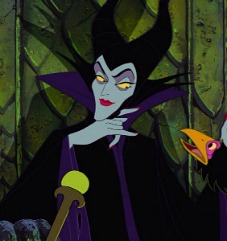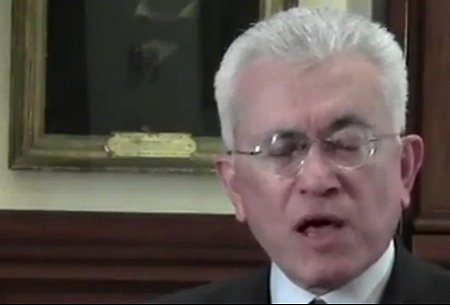I don’t think I can watch any more Dark Knight Rises trailers after this. This is it. I’m done, spent. I’m even feeling a very slight Dark Knight backlash impulse building within. (Just a little tiny trace of one.) Is it me or does this trailer seem to emphasize Joseph Gordon-Levitt just as much if not a bit more than Christian Bale?
Newsroom Gets Slapped
In a review dated 6.25, New Yorker critic Emily Nussbaum conveys some admiration for Aaron Sorkin‘s The Newsroom (HBO, premiering 6.24). She says it has the same kind of energy that The West Wing and The Social Network had. But mostly she rips into it, and into Sorkin’s writing style. Episodes 3 and 4 suck, she says. Especially 4. She hasn’t seen 5 through 10.
But I don’t know. There’s something about Nussbaum’s own fevered writing style that suggests she might have been thinking about picking a fight with this show no matter what. She seems to enjoy being pissy and ultra-particular, or so I’m sensing. In any event, The Newsroom needs someone to ride in on a white horse and say, “Nussbaum is a smart and feisty writer, but she has a stick up her butt! Listen to me instead!”
“This is not to say that The Newsroom doesn’t score points now and then, if you share its politics,” Nussbaum writes. “It starts effectively enough, with an homage to Network ‘s galvanizing ‘I’m mad as hell’ rant, as McAvoy, a blandly uncontroversial cable big shot whom everyone tauntingly calls Leno, is trapped on a journalism-school panel. When the moderator needles him into answering a question about why America is the greatest country on earth, he goes volcanic, ticking off the ways in which America is no such thing, then closing with a statement of hope, about the way things used to be.
“This speech goes viral, and his boss (Sam Waterston) and his producer, MacKenzie McHale (Emily Mortimer), who’s also his ex-girlfriend, encourage him to create a purer news program, purged of any obsession with ratings and buzz.
“Much of McAvoy’s diatribe is bona-fide baloney — false nostalgia for an America that never existed — but it is exciting to watch. And if you enjoyed The West Wing, Sorkin’s helpful counterprogramming to the Bush Administration, your ears will prick up. The pilot of The Newsroom is full of yelling and self-righteousness, but it’s got energy, just like The West Wing, Sorkin’s Sports Night and his hit movie The Social Network.
“The second episode is more obviously stuffed with piety and syrup, although there’s one amusing segment, when McAvoy mocks some right-wing idiots. After that, The Newsroom gets so bad so quickly that I found my jaw dropping. The third episode is lousy (and devolves into lectures that are chopped into montages). The fourth episode is the worst. There are six to go.”
Bring It On
Great, just what we need — another scheming ego queen of a certain age, out to destroy a fair young maiden. The similarities between Angelina Jolie‘s raging bitch in Malificent and the animated queen in Disney’s 1959 Sleeping Beauty are something to start with. No harm in it. But after the last two Snow White movies…you know what I’m saying.


Jungfrau
The Jungfrau (German for “virgin”) is one of the main summits in the Bernese Alps. Together with the Eiger and Monch, the Jungfrau forms a massive wall overlooking the Bernese Oberland. Visually thrilling, awesome, fascinating — adjectives fail. The journey to the Jungfraujoch — at 3454 metres Europe’s highest altitude railway station — is two hours each way from Lauterbrunnen. That plus hiking uphill for 90 minutes through snow and clouds lasted six and a half hours.

Late August
If Paul Thomas Anderson‘s The Master is going to play the Venice Film Festival, as rumored, surely there’s a decent chance it’ll also play Telluride…no? Along with Terrence Malick‘s To The Wonder and Brian De Palma‘s Passion with Rachel McAdams and Noomi Rapace (which will probably be minor at best — DePalma’s best days are long past)
Elevation
Obviously I can’t deliver the usual energy and absorption when I’m spending much of my time hiking around the Bernese Alps in Switzerland. But I haven’t enjoyed any serious downshifting in ages, and if you don’t do this at least once every eight or ten years you’re probably going to suffer some kind of loss that will diminish creativity or the bank balance or both. Live and let live, right? It’s only for another eight or nine days and then it’s back to the L.A. grindstone.
Seeking A Friend Blows?
Eric Kohn‘s pan of Lorene Scafaria‘s Seeking A Friend For The End of The World (Focus, 6.22) is a little too cerebral and tap-dancy, so here’s what my son Dylan told me after catching a screening last week: “It’s a shitty movie. Scafaria doesn’t seem invested in the idea of an asteroid about to hit the earth…she just wants to end the world for any reason. And none of the characters are interested in trying to survive. It feels like nothing. I just wanted the asteroid to come and kill everyone.”
The film “valiantly tries to inject a familiar premise with renewed emotional discernment and instead flails about in search of it,” Kohn writes. “The directorial debut of screenwriter Lorene Scafaria (Nick & Norah’s Infinite Playlist), Seeking a Friend follows a pair of would-be lovers on a meandering road trip that takes place in the weeks leading up to the destruction of the Earth, a tried-and-true set-up that provides a simple backdrop for exploring lost souls in search of meaning in their final days.
“While smartly observant in individual moments, Scafaria’s thinly conceived story fails to deepen its scenario beyond the basic allegorical possibilities of the oncoming apocalypse.
“Cast in the same disaffected everyman role he embodies to a fault every time out, Steve Carrell plays somber insurance salesman Dodge, whose wife promptly abandons him upon news of Earth’s imminent demise. With 21 days to go before the cataclysmic event, Seeking a Friend launches Dodge’s titular mission through a series of title cards that lead up to the final moments. That recurring device creates the perception of a gradual build to an expected revelatory payoff, but the movie never rises to the challenge. In the process of relying alternately on poetic restraint and gags, the film’s emotional grounding slowly dissipates.”
Let The Uglies Win
The essence of Roberto Unger’s three-week-old YouTube video, which explained why he believes President Obama does not deserve to be re-elected, is bluntly phrased but more or less correct. Obama has failed to advance the progressive cause in the United States, true, because he is a center-right conservative with an aversion to political combat and bringing pain into the lives of his opponents, which is what any good politician must do.

But Unger is an egghead purist. He is essentially saying “this man is not what he seemed — he is certainly not doing what many of us would have him do — so let’s pull the temple down upon our heads and let Romney win.” And that is insane.
Versailles Lesbo Action
Benoit Jacquot‘s Farewell My Queen, set in 1789 on the verge of Bastille Day, “has its own charm, a matter-of-fact treatment of lesbianism and magnifique costumes and settings [that] opts for the grand European style of Girl With a Pearl Earring rather than a modernist rereading a la Sofia Coppola‘s post-punk vision Marie Antoinette.” Indiewire‘s Anne Thompson called it “an intimate and sexy period spectacle that takes us backstage at Versailles and into territory Sofia Coppola was not willing to go.”
From Variety‘s Justin Chang: “Benoit Jacquot’s venom-tipped account of palatial intrigue and royal oblivion scrupulously maintains a servant’s-eye view but winds up holding the viewer at an unrewarding distance.”
Vague Aura of Death
Two or three hours ago I was sitting at an outdoor cafe in Grindelwald (a 20-minute drive from Lauterbrunnen) and staring up at the somewhat spooky, occasionally cloud-covered Eiger — not the biggest or tallest mountain in the world but one that has killed at least 64 climbers who’ve tried to ascend its north face since 1935. Phillip Stolzl‘s North Face implanted the mystique. If the Eiger had a reddish tint it would look a bit like Cecil B. DeMille‘s Mt. Sinai in The Ten Commandments (’56).

Tyrrell
For me, Susan Tyrrell‘s most inspired performance was in Anthony Page‘s I Never Promised You A Rose Garden (’77) in which she played a fruit-loopy resident of a sanitarium that is shared by Kathleen Quinlan. Most obit writers are citing her Oscar-nominated performance in John Huston‘s Fat City (’72), by any measure a vivid and honorable thing. She had a tough life after losing her legs twelve years ago. Condolences to family, friends, fans.
Feinberg-Dunham
“What is the secret of Lena Dunham‘s success?,” asks The Hollywood Reporter‘s Scott Feinberg in a 6.18 article. “She won’t say it, but I will: She is startlingly brilliant — in equal measures smart and funny — and eagerly self-deprecating. Think of a female Woody Allen or Larry David.
“This is something that I had suspected from watching her work, but that was confirmed to me, beyond any shadow of a doubt, by the hour that we spent together in Brooklyn a little over a week ago, during which we discussed a wide range of matters pertaining to her life and work.”



